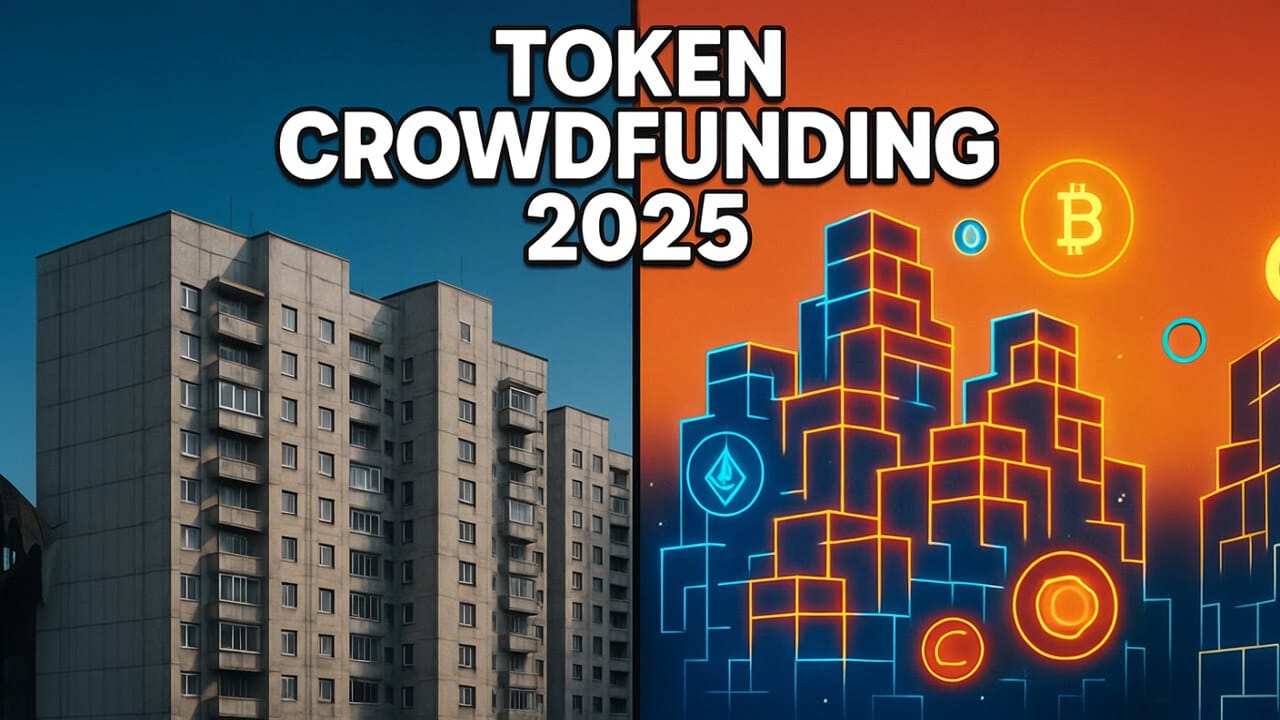Remember how we talked about REITs dying?
Well, it's not hyperbole—traditional Real Estate Investment Trusts (REITs) are indeed under existential threat, with their indirect ownership models, high fees, and limited liquidity being eclipsed by blockchain-based tokenization. This shift is democratizing real estate, allowing direct fractional ownership of specific properties worldwide, instant trades, and automated earnings without intermediaries. Drawing from recent industry momentum, let's break down why REITs are fading, key 2025 updates, and simple ways to pivot into tokenized assets.
Crowdfunding just got smarter and more accessible.
What is Crowdfunding and Tokenization? The Intersection of Both Concepts.
Crowdfunding gathers small investments from many people to fund projects, like building a condo or flipping a hotel.
It's been around, but it's often clunky with paperwork, high minimums, and no easy exit. Tokenization intersects here by turning the property into digital tokens on a blockchain—think secure, shareable pieces anyone can buy, sell, or trade like stocks. This mashup creates "tokenized crowdfunding": Funds pool via platforms, but ownership is fractional and liquid. No more locked-in shares; smart contracts handle payouts automatically, cutting delays and costs by up to 70%.
For instance, a $10M apartment project could be crowdfunded with 10,000 tokens at $1K each, tradable 24/7.
It's like Kickstarter meets crypto, but for real assets—boosting accessibility while adding transparency and speed.
Web3 is an Internet owned by users and builders orchestrated with tokens.
Who Is This For, and Why Jump In?
This evolution targets everyday investors tired of REITs' opacity, crypto fans dipping into real estate, and high-net-worth folks seeking diversification.
If you're a millennial with some savings to spare, a retiree wanting passive income, or a global nomad eyeing Bali spots, it's for you.
Why? It lowers barriers (starting at $100 vs. $100K+), offers potential 8-15% yields without fund managers skimming fees, and spreads risk across properties worldwide. In a volatile economy, it provides stable assets with liquidity perks, like selling mid-project if needed.
Plus, it's inclusive: 2025 trends show more women and young investors joining, as platforms simplify entry.
🏙️ Stay on top of the future of investments
(real estate tokenization news, 30th of June to 6th of July 2025)
Japanese Real Estate Firm GATES to Tokenize $75 M in Tokyo Property
GATES will convert $75 million of central Tokyo income-generating properties into digital tokens on the Oasys blockchain to streamline foreign investment by automating title transfers and regulatory compliance. This pilot marks one of Japan’s largest real estate tokenization efforts to date and paves the way for broader adoption of blockchain rails in property markets. (learn more)
Japan’s GATES to Tokenize $200 B in Property Assets
Building on its Tokyo pilot, GATES announced plans to eventually tokenize over $200 billion worth of real estate—approximately 1% of Japan’s market—using Oasys to lower barriers like legal complexity and language for overseas investors. The initiative signals Oasys’s expansion from gaming into real-world assets and aims to scale globally across the U.S., Europe, and Asia. (learn more)
Blocksquare Surpasses $200 M in Tokenized Real Estate as RWA Market Booms
Blocksquare’s infrastructure has now tokenized over $200 million in real estate assets across 66 properties in 29 countries, contributing to an 800 % surge in total value locked (TVL) in real-world asset tokenization this year. This milestone underscores growing institutional and retail interest in fractional property ownership via blockchain. (learn more)
Dubai Wins the Real Estate Tokenization Play
Dubai has rolled out a regulated blockchain framework that tokenizes title deeds, enabling global retail investors to purchase fractional shares in prime properties on the XRP Ledger—a move hailed as democratizing access to high-value real estate. The city’s approach combines government backing, clear regulations, and institutional partnerships to position itself as a global leader in property tokenization. (learn more.)
Kadena Allocates First $400K Grant to UK Tokenized Real Estate Pilot
The public blockchain Kadena deployed the first $400,000 from its $50 million tokenization fund to CurveBlock, marking the startup as the inaugural real estate firm in the Bank of England’s Digital Securities Sandbox. This grant underscores institutional backing for compliant real-world asset experiments and positions Kadena at the forefront of regulated property tokenization in the UK. (learn more.)
To wrap up, let's explore some standout real-world examples of tokenized crowdfunding in action.
These cases demonstrate how platforms are blending community funding with blockchain to make real estate more accessible and efficient. From global participation to sustainable projects, they show the practical power of this intersection.
ADDX in Singapore: Launched tokenized REIT offerings that let investors access diverse property portfolios with real-time dividends and borderless participation, drawing backers from over 20 countries for multi-million-dollar funds. (learn more)
Smartlands: Tokenized international properties, such as a villa in Tuscany, enabling fractional ownership with crypto payments and automated income distribution to global investors. (learn more)
Greenbrix: Focuses on sustainable housing by tokenizing eco-projects that track environmental impact on-chain, raising funds for LEED-certified builds with yields tied to green milestones. (learn more)
Fraxtor in Singapore: Tokenized luxury homes with low investment thresholds, providing quick liquidity through secondary trades. (learn more)
Vairt: Allows property owners to crowdfund developments by tokenizing assets into tradable shares, appealing to small investors chasing high returns. (learn more)
Your Quick Start Guide: 3 Steps to Dive In
Choose a Provider: Explore user-friendly ones like Bali Invest, ADDX or Fraxtor for compliant, easy entries.
Vet Opportunities: Check asset verification, smart contract audits, and team credentials to avoid risks.
Monitor and Trade: Use apps like tZERO for real-time updates; sell on secondary markets for flexibility.
That’s a wrap for today.
Talk soon.
Kevin
Do you have any questions about real estate tokenization?
We’re here to help you make informed decisions—not to sell you something you don’t understand.
At Bali Invest, we’ve helped global investors navigate the emerging world of tokenized real estate, with projects like Segara Seaside and Lovina Retreat & Wellness Center leading the way.
1-on-1 Strategy Call with our Team
Let’s map out your investment journey.
We invite you to schedule a complimentary 20-minute call with us.
Evaluate if Bali real estate is right for you
Show you how tokenization lowers your risk
Answer your biggest questions
RESOURCES
Download your free e-book and discover how to invest in Bali real estate like a pro:
Get instant access to our 5-day free educational online course to kickstart your tokenization and real estate investments.



